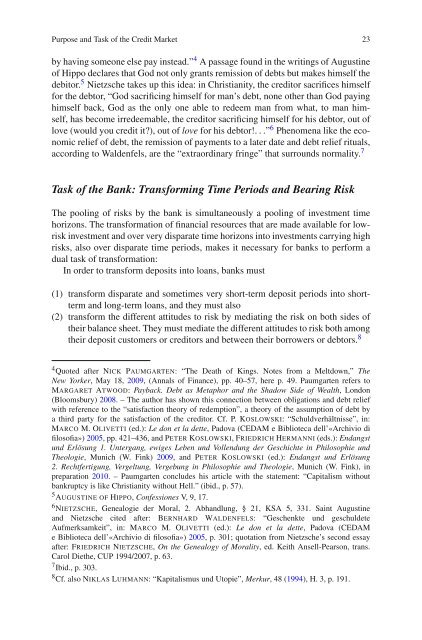The Ethics of Banking: Conclusions from the Financial Crisis (Issues ...
The Ethics of Banking: Conclusions from the Financial Crisis (Issues ...
The Ethics of Banking: Conclusions from the Financial Crisis (Issues ...
Create successful ePaper yourself
Turn your PDF publications into a flip-book with our unique Google optimized e-Paper software.
Purpose and Task <strong>of</strong> <strong>the</strong> Credit Market 23<br />
by having someone else pay instead.” 4 A passage found in <strong>the</strong> writings <strong>of</strong> Augustine<br />
<strong>of</strong> Hippo declares that God not only grants remission <strong>of</strong> debts but makes himself <strong>the</strong><br />
debitor. 5 Nietzsche takes up this idea: in Christianity, <strong>the</strong> creditor sacrifices himself<br />
for <strong>the</strong> debtor, “God sacrificing himself for man’s debt, none o<strong>the</strong>r than God paying<br />
himself back, God as <strong>the</strong> only one able to redeem man <strong>from</strong> what, to man himself,<br />
has become irredeemable, <strong>the</strong> creditor sacrificing himself for his debtor, out <strong>of</strong><br />
love (would you credit it?), out <strong>of</strong> love for his debtor!...” 6 Phenomena like <strong>the</strong> economic<br />
relief <strong>of</strong> debt, <strong>the</strong> remission <strong>of</strong> payments to a later date and debt relief rituals,<br />
according to Waldenfels, are <strong>the</strong> “extraordinary fringe” that surrounds normality. 7<br />
Task <strong>of</strong> <strong>the</strong> Bank: Transforming Time Periods and Bearing Risk<br />
<strong>The</strong> pooling <strong>of</strong> risks by <strong>the</strong> bank is simultaneously a pooling <strong>of</strong> investment time<br />
horizons. <strong>The</strong> transformation <strong>of</strong> financial resources that are made available for lowrisk<br />
investment and over very disparate time horizons into investments carrying high<br />
risks, also over disparate time periods, makes it necessary for banks to perform a<br />
dual task <strong>of</strong> transformation:<br />
In order to transform deposits into loans, banks must<br />
(1) transform disparate and sometimes very short-term deposit periods into shortterm<br />
and long-term loans, and <strong>the</strong>y must also<br />
(2) transform <strong>the</strong> different attitudes to risk by mediating <strong>the</strong> risk on both sides <strong>of</strong><br />
<strong>the</strong>ir balance sheet. <strong>The</strong>y must mediate <strong>the</strong> different attitudes to risk both among<br />
<strong>the</strong>ir deposit customers or creditors and between <strong>the</strong>ir borrowers or debtors. 8<br />
4 Quoted after NICK PAUMGARTEN: “<strong>The</strong> Death <strong>of</strong> Kings. Notes <strong>from</strong> a Meltdown,” <strong>The</strong><br />
New Yorker, May 18, 2009, (Annals <strong>of</strong> Finance), pp. 40–57, here p. 49. Paumgarten refers to<br />
MARGARET ATWOOD: Payback. Debt as Metaphor and <strong>the</strong> Shadow Side <strong>of</strong> Wealth, London<br />
(Bloomsbury) 2008. – <strong>The</strong> author has shown this connection between obligations and debt relief<br />
with reference to <strong>the</strong> “satisfaction <strong>the</strong>ory <strong>of</strong> redemption”, a <strong>the</strong>ory <strong>of</strong> <strong>the</strong> assumption <strong>of</strong> debt by<br />
a third party for <strong>the</strong> satisfaction <strong>of</strong> <strong>the</strong> creditor. Cf. P. KOSLOWSKI: “Schuldverhältnisse”, in:<br />
MARCO M. OLIVETTI (ed.): Le don et la dette, Padova (CEDAM e Biblioteca dell’«Archivio di<br />
filos<strong>of</strong>ia») 2005, pp. 421–436, and PETER KOSLOWSKI,FRIEDRICH HERMANNI (eds.): Endangst<br />
und Erlösung 1. Untergang, ewiges Leben und Vollendung der Geschichte in Philosophie und<br />
<strong>The</strong>ologie, Munich (W. Fink) 2009, andPETER KOSLOWSKI (ed.): Endangst und Erlösung<br />
2. Rechtfertigung, Vergeltung, Vergebung in Philosophie und <strong>The</strong>ologie, Munich (W. Fink), in<br />
preparation 2010. – Paumgarten concludes his article with <strong>the</strong> statement: “Capitalism without<br />
bankruptcy is like Christianity without Hell.” (ibid., p. 57).<br />
5 AUGUSTINE OF HIPPO, Confessiones V, 9, 17.<br />
6 NIETZSCHE, Genealogie der Moral, 2. Abhandlung, § 21, KSA 5, 331. Saint Augustine<br />
and Nietzsche cited after: BERNHARD WALDENFELS: “Geschenkte und geschuldete<br />
Aufmerksamkeit”, in: MARCO M. OLIVETTI (ed.): Le don et la dette, Padova (CEDAM<br />
e Biblioteca dell’«Archivio di filos<strong>of</strong>ia») 2005, p. 301; quotation <strong>from</strong> Nietzsche’s second essay<br />
after: FRIEDRICH NIETZSCHE, On <strong>the</strong> Genealogy <strong>of</strong> Morality, ed. Keith Ansell-Pearson, trans.<br />
Carol Die<strong>the</strong>, CUP 1994/2007, p. 63.<br />
7 Ibid., p. 303.<br />
8 Cf. also NIKLAS LUHMANN: “Kapitalismus und Utopie”, Merkur,48(1994), H. 3, p. 191.

















